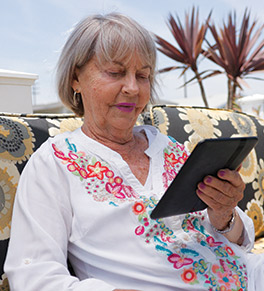A sister’s gift restores sight

“You just don’t know how much your vision matters until it’s not what it should be,” says Karen Ketchum, who underwent a rare stem-cell transplant eye surgery at UCI Health.
Karen Ketchum had just gone through surgery to remove a melanoma followed by immunotherapy when she developed a mysterious new condition, lesions that began appearing all over her body, including her eyes, making it hard to see.
Soon Ketchum was unable to drive or even cook for herself. She had to leave her job as a senior executive assistant at a local healthcare company and hire a home caregiver. She saw several optometrists and ophthalmologists, who were stumped by her symptoms.
Eventually she was referred to the UCI Health Gavin Herbert Eye Institute and ophthalmologist Marjan Farid, MD, a specialist in cornea surgery and ocular stem cell transplantation who leads the newly established UCI Health Severe Ocular Surface Disease Program.
Farid focused on restoring Ketchum’s vision while her colleague, UCI Health dermatologist Sergei Grando, MD, PhD, treated the underlying cause, an extremely rare autoimmune condition called pemphigoid.
The skin-blistering disease had seriously damaged the surface of Ketchum’s corneas, but the eye surgeon was able to transplant eye tissue called limbal cells from Ketchum's sister to heal her eye.
“Dr. Farid is absolutely wonderful," Ketchum says. "She’s so busy, it’s incredible. But she always takes the time to explain what she’s doing and why.”
UCI Health is only the second location in the world to offer the highly effective transplant procedure pioneered by University of Cincinnati ophthalmologist Edward Holland, MD, who trained Farid and continues to mentor her.
Severe ocular surface disease is often caused by contact with chemicals or extreme heat in the workplace. Others may suffer damage as a side effect of treatments like cancer chemotherapy. A genetic disorder or autoimmune diseases, as in Ketchum's case, can also lead the body to attack eyes and eyelids, causing similar eye surface damage.
Because the damage is so great, cornea transplants and other therapies aren't an option. The treatment Holland developed involves harvesting limbal cells from a donor's eye and transplanting them into the patient. He also employed practices followed by kidney transplant programs to prevent the body from rejecting the donor eye cells.
A donor with healthy eye tissue can give up to 50% of their limbal stem cells because they grow back naturally. Siblings are usually the best match.
That was the case for Ketchum, whose sister accompanied her to the eye institute in April 2022 for what she calls a “very simple procedure.” Farid harvested limbal cells from her sister and immediately transplanted them into Ketchum's right eye.
Within just a few months, Ketchum was living independently again and even driving sometimes. “I was thrilled when I could see the numbers on my oven and microwave so I could cook for myself again,” she says.
She’s already talking with Farid about having the transplant procedure on her left eye.
Ketchum, 80, plans to be like her grandmother, who was going strong until age 94.
“I think everybody should have the opportunity to be at their very best, and sight is a very big part of our lives,” she says. “You just don’t know how much your vision matters until it’s not what it should be.”





